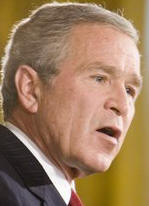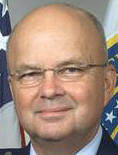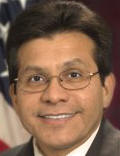Bush, Gonzales & Hayden Discuss Presidential
Intercepts and PATRIOT Act
December 19, 2005. President Bush held a news conference at the White House at which he again discussed and promoted the National Security Agency's (NSA) communications intercept program, that is authorized by President Bush rather than any court. See, transcript. The program was first publicly reported in the Friday, December 16, issue of the New York Times.
Attorney General Alberto Gonzales and General Michael Hayden also held held a separate news conference on December 19. See, transcript. Hayden has been an Air Force officer since 1967, and is now the highest ranking military intelligence officer in the U.S. armed forces. He is the Principal Deputy Director for National Intelligence.
Bush called the leak of the existence of the program a "shameful act" that harms national security. Gonzales said that the program had been the government's "most classified" program. All remained secretive about the exact nature of the program. General Hayden said that "what we are talking about here are communications we have every reason to believe are al Qaeda communications, one end of which is in the United States".
General Hayden added that "This program has been successful in detecting and preventing attacks inside the United States."
The three explained that the reason for relying upon Presidential authority, rather than seeking approval from the court established by the Foreign Intelligence Surveillance Act (FISA), is that the FISA procedure does not proceed quickly enough to enable intercepts of certain terrorist communications that are conducted with new technologies and tactics.
General Hayden added that "I can say unequivocally, all right, that we have got information through this program that would not otherwise have been available."
Disclosure of the NSA Program. While the NSA program began after the terrorist attacks of September 11, 2001, its existence was not publicly disclosed until Friday, December 16, 2005. The New York Times published a story by James Risen and Eric Lichtblau titled "Bush Lets U.S. Spy on Callers Without Courts". It stated that "President Bush secretly authorized the National Security Agency to eavesdrop on Americans and others inside the United States to search for evidence of terrorist activity without the court-approved warrants ordinarily required for domestic spying, according to government officials."
President Bush first confirmed the existence of the NSA program in his radio address on Saturday, December 17, 2005. See, story titled "President Bush Discloses Interception of Communications Without Court Approval" in TLJ Daily E-Mail Alert No. 1,275, December 19, 2005.
He provided more detail in his Monday, December 19, news conference.
 Bush (at left) said
in his East Room news conference that "it was a shameful act for someone to disclose
this very important program in a time of war. The fact that we're discussing this program
is helping the enemy."
Bush (at left) said
in his East Room news conference that "it was a shameful act for someone to disclose
this very important program in a time of war. The fact that we're discussing this program
is helping the enemy."
Gonzales said at his news conference earlier in the day that the leak "is really hurting national security, this has really hurt our country, and we are concerned that a very valuable tool has been compromised".
Gonzales added that this was "probably the most classified program that exists in the United States government".
Nature of the NSA Program. However, all three remained vague as to what the program is.
Bush said that the program involves intercepts of communications between someone in the U.S. and someone outside the U.S. He did not say what kind of communications facilities are involved. He did not discuss the technological means of interception. He did not discuss the number of intercepts. He said that this program would not apply to a communications between two persons in the U.S., although he added, that that might be subject to a FISA intercept.
He said that "I authorized the interception of international communications of people with known links to al Qaeda and related terrorist organizations." And, he said, "it has been effective in disrupting the enemy".
However, when he was asked, "in making the case for domestic spying, could you tell us about the planned attacks on the U.S. that were thwarted through your domestic spying plan?", he declined to provide any information.
Bush responded "No, I'm not going to talk about that, because it would help give the enemy notification and/or, perhaps, signal to them methods and uses and sources. And we're not going to do that, which is -- it's really important for people to understand that the protection of sources and the protections of methods and how we use information to understand the nature of the enemy is secret. And the reason it's secret is because if it's not secret, the enemy knows about it, and if the enemy knows about it, adjusts."
Hayden gave the most concise one line description of the NSA program: "what we are talking about here are communications we have every reason to believe are al Qaeda communications, one end of which is in the United States."
Gonzales said that "The President has authorized a program to engage in electronic surveillance of a particular kind, and this would be the intercepts of contents of communications where one of the -- one party to the communication is outside the United States. And this is a very important point -- people are running around saying that the United States is somehow spying on American citizens calling their neighbors. Very, very important to understand that one party to the communication has to be outside the United States."
Gonzales added that "Another very important point to remember is that we have to have a reasonable basis to conclude that one party to the communication is a member of al Qaeda, affiliated with al Qaeda, or a member of an organization affiliated with al Qaeda, or working in support of al Qaeda. We view these authorities as authorities to confront the enemy in which the United States is at war with -- and that is al Qaeda and those who are supporting or affiliated with al Qaeda."
"What we're trying to do is learn of communications, back and forth, from within the United States to overseas with members of al Qaeda. And that's what this program is about", said the Attorney General.
But, Gonzales said, "The program remains highly classified", and many of the "operational aspects" will not be disclosed.
General Hayden said that "This program has been successful in detecting and preventing attacks inside the United States."
Why FISA Was Not Used. The FISA process is secretive, and the FISA court only rarely turns down a request. President Bush was thus asked why he did not rely upon FISA court approved intercepts. Bush responded that "FISA is for long-term monitoring. What is needed in order to protect the American people is the ability to move quickly to detect." He later added that "people are changing phone numbers and phone calls, and they're moving quick. And we've got to be able to detect and prevent. I keep saying that, but this is a -- it requires quick action."
Similarly, Gonzales said that "The operators out at NSA tell me that we don't have the speed and the agility that we need, in all circumstances, to deal with this new kind of enemy. You have to remember that FISA was passed by the Congress in 1978. There have been tremendous advances in technology".
The FISA "it doesn't provide the speed and the agility that we need in all circumstances to deal with this new kind of threat".
 General Hayden
(at right) added that "I don't think anyone could claim that FISA was
envisaged as a tool to cover armed enemy combatants in preparation for attacks
inside the United States. And that's what this authorization under the President
is designed to help us do."
General Hayden
(at right) added that "I don't think anyone could claim that FISA was
envisaged as a tool to cover armed enemy combatants in preparation for attacks
inside the United States. And that's what this authorization under the President
is designed to help us do."
Hayden continued that the "FISA involves marshaling arguments; FISA involves looping paperwork around, even in the case of emergency authorizations from the Attorney General. And beyond that, it's a little -- it's difficult for me to get into further discussions as to why this is more optimized under this process without, frankly, revealing too much about what it is we do and why and how we do it."
The FISA was enacted in 1978. It is Public Law 95–511. It has been amended since then by many statutes, including the 2001 USA PATRIOT Act.
Hayden said, "I can say unequivocally, all right, that we have got information through this program that would not otherwise have been available."
He added, "Yes, because of the speed, because of the procedures, because of the processes and requirements set up in the FISA process, I can say unequivocally that we have used this program in lieu of that and this program has been successful."
Bush was also asked why "has your administration not sought to get changes in the law instead of bypassing it"? Bush said "I think I've got the authority". He added that "an open debate about law would say to the enemy, here is what we're going to do. And this is an enemy which adjusts".
Legal Authority for the NSA Program. Bush argued that he has the power to authorize this program, but provided little information as to the source or extent of his authority. He said that his program is "consistent with U.S. law and the Constitution".
Gonzales gave the more detailed articulation of the asserted legal authorities for the NSA program. He said that there are two separate bases. First, the Congressional resolution authorizing the use of force. And second, the is the President's Constitutional authority as commander in chief.
 Gonzales (at left)
said that "Now, in terms of legal authorities, the Foreign Intelligence Surveillance
Act provides -- requires a court order before engaging in this kind of surveillance
that I've just discussed and the President announced on Saturday, unless there
is somehow -- there is -- unless otherwise authorized by statute or by Congress.
That's what the law requires. Our position is, is that the authorization to use
force, which was passed by the Congress in the days following September 11th,
constitutes that other authorization, that other statute by Congress, to engage
in this kind of signals intelligence.
Gonzales (at left)
said that "Now, in terms of legal authorities, the Foreign Intelligence Surveillance
Act provides -- requires a court order before engaging in this kind of surveillance
that I've just discussed and the President announced on Saturday, unless there
is somehow -- there is -- unless otherwise authorized by statute or by Congress.
That's what the law requires. Our position is, is that the authorization to use
force, which was passed by the Congress in the days following September 11th,
constitutes that other authorization, that other statute by Congress, to engage
in this kind of signals intelligence.
Gonzales conceded that there is there is no Congressional war resolution that "specifically mentions electronic surveillance". But, he argued that this is not necessary. He argued that signals intelligence is "a fundamental incident of war" that has been authorized by the Congress, even if not enumerated in a resolution.
Referring to the Supreme Court's opinion in Hamdi v. Rumsfeld, 542 U.S. 507, he said that "even though signals intelligence is not mentioned in the authorization to use force, we believe that the Court would apply the same reasoning to recognize the authorization by Congress to engage in this kind of electronic surveillance."
Gonzales second argument is that "the President has the inherent authority under the Constitution, as Commander-in-Chief, to engage in this kind of activity. Signals intelligence has been a fundamental aspect of waging war since the Civil War, where we intercepted telegraphs, obviously, during the world wars, as we intercepted telegrams in and out of the United States. Signals intelligence is very important for the United States government to know what the enemy is doing, to know what the enemy is about to do."
Article II, Section 2, of the Constitution enumerates the powers of the President. It begins, "The President shall be Commander in Chief of the Army and Navy of the United States, and of the Militia of the several States, when called into the actual Service of the United States;"
Gonzales also discussed the 4th Amendment of the Constitution, which provides that "The right of the people to be secure in their persons, houses, papers, and effects, against unreasonable searches and seizures, shall not be violated, and no Warrants shall issue, but upon probable cause, supported by Oath or affirmation, and particularly describing the place to be searched,, and the persons or things to be seized."
He said "we feel comfortable that this surveillance is consistent with requirements of the 4th Amendment. The touchstone of the 4th Amendment is reasonableness, and the Supreme Court has long held that there are exceptions to the warrant requirement in -- when special needs outside the law enforcement arena. And we think that that standard has been met here. When you're talking about communications involving al Qaeda, when you -- obviously there are significant privacy interests implicated here, but we think that those privacy interests have been addressed; when you think about the fact that this is an authorization that's ongoing, it's not a permanent authorization, it has to be reevaluated from time to time. There are additional safeguards that have been in place -- that have been imposed out at NSA, and we believe that it is a reasonable application of these authorities."
Extension of the Sunsetted Provisions of the PATRIOT Act. President Bush also used this news conference to discuss the USA PATRIOT Act, the sections of the Act that are scheduled to expire on December 31, 2005, and legislative efforts to amend the Act and extend the sunsetted provisions.
The House approved the conference report on HR 3199, the "USA PATRIOT Improvement and Reauthorization Act of 2005", on December 14, 2005, by a vote of 251-174. See, story "House Approves Conference Report on PATRIOT Act Extension Bill" in TLJ Daily E-Mail Alert No. 1,273, December 15, 2005.
The Senate rejected a motion to invoke cloture on the conference report, by a vote of 52-47, on Friday, December 16, 2005.
President Bush said at his December 19 news conference that "It is inexcusable for the United States Senate to let this Patriot Act expire."
He elaborated that "the Patriot Act helps us connect the dots. And now the United States Senate is going to let this bill expire. Not the Senate -- a minority of senators. And I want senators from New York or Los Angeles or Las Vegas to go home and explain why these cities are safer. It is inexcusable to say, on the one hand, connect the dots, and not give us a chance to do so. We've connected the dots, or trying to connect the dots with the NSA program. And, again, I understand the press and members of the United States Congress saying, are you sure you're safeguarding civil liberties. That's a legitimate question, and an important question. And today I hope I'll help answer that. But we're connecting dots as best as we possibly can."
Sen. Patrick Leahy
(D-VT) responded in a
release that
"Unfortunately, the President persists in misstating the facts about the effort
to fix the problems in the PATRIOT Act. There is no reason why the American
people cannot have a PATRIOT Act that is both effective and that adequately
protects their rights and their privacy."